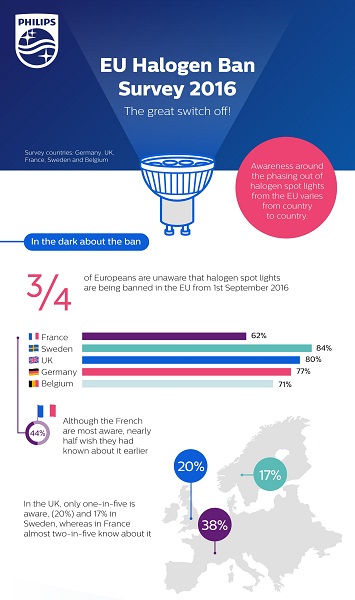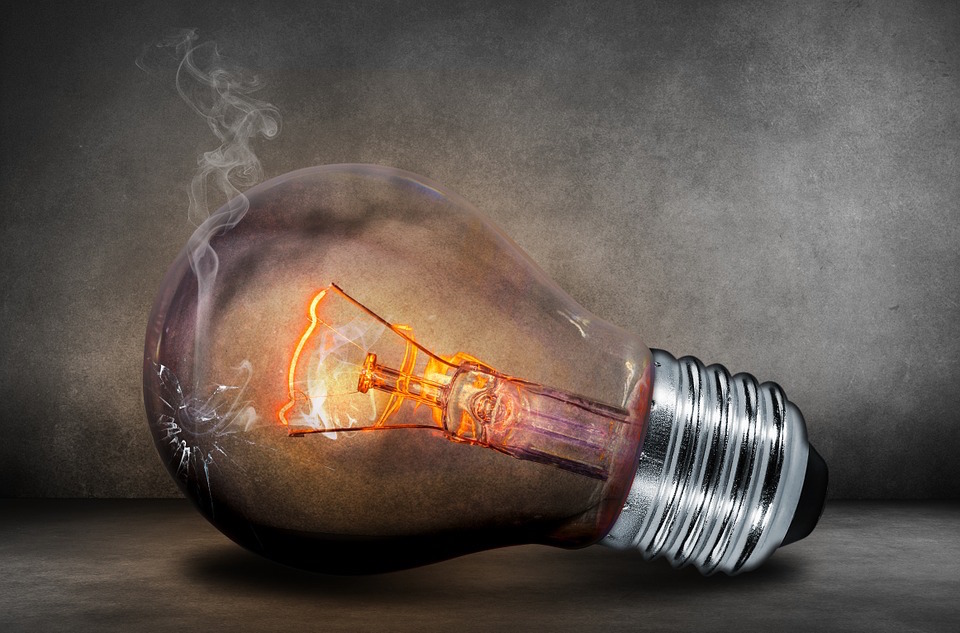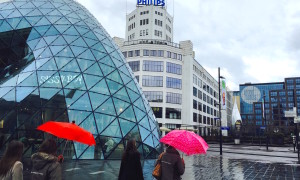We were not the only people to miss this. We just saw a news release from Dutch electronics giant Philips stating most Europeans – much less expats – have no idea they won’t be able to buy halogen spotlights for homes or offices by 2018.
 A European Union-wide phase-out starts tomorrow, 1 September 2016. As halogens become history, you’ll only be able to purchase LED bulbs to replace your halogen spots.
A European Union-wide phase-out starts tomorrow, 1 September 2016. As halogens become history, you’ll only be able to purchase LED bulbs to replace your halogen spots.
(Was THIS what Brexit was really all about? Apparently not, because hardly anyone in the U.K. knows about this.)
Yes, they put out fabulous light. But the EU has designated halogen reflector lightbulbs as inefficient energy sucks. LED lights are 90 percent more efficient and last as much as 10 or 12 times longer than halogen, according to the pro-LED information we’ve seen online. (And don’t think you’ll switch to incandescent bulbs … they were banned years ago, even in the regulatory-resistant United States.)
But there are some, ah, issues with LED, including the fact the stores we’ve checked are charging at least twice as much for the LED bulbs. That, and if you have your mood lighting on dimmer switches, you have to replace the dimmer switches as well. Which is probably something best left to a 50-euro-per-hour electrician.
(The halogen ban doesn’t go into full effect until 2018 to give time manufacturers more time to fix the dimmer thing, and to correct LEDs’ wonky spectral content of light. That is, how much blue, green, yellow and red is in the LED light, which tend toward an unflattering blue.)
Unfortunately, the general European public totally missed all this, according to Philips, who did their own pan-European study.
From Philips:
The study of over 5,000 adults across five European countries – Germany, UK, France, Sweden and Belgium – found that the Swedish were the most in the dark with four in five (84%) of respondents unaware of the new legislation – particularly surprising considering Swedish households experience significantly reduced hours of daylight in the winter, and depend heavily on lighting to go about their daily lives. While the French were the most aware of the ban with over two thirds (62%) declaring knowledge of it. However, it is the French, who felt that more information about the ban was needed with nearly half (44%) claiming they would have liked to have known sooner about it.
“In the dark” … we get it. Ha!
Actually, the “research” is the prelude for Philips announcing their own LED Spot WarmGlow bulbs, the first that totally replicate halogen. What a coincidence!
One good thing came out of this … we discovered the Which? consumer website, which is similar to Consumer Reports, the non-profit, advertising-free consumer testing group that publishes objective tests of everything from automobiles to toilet paper.
The Council of the Consumers’ Association is the ultimate governing body for Which?, which is a non-profit company.
Which? research shows LED bulbs last much longer, and prices are dropping.
Best of all, the group found the 42-watt halogen spotlights as bright as a conventional 60-watt bulb typically cost British consumers about 30 pounds per year in energy costs, while a comparable 10-watt LED light costs 7 pounds … 75 percent less.
And before we forget, how many bureaucrats does it take to change a light bulb? The answer, of course, is 28 … the number of European Commissioners who voted on the halogen ban in April 2015.














